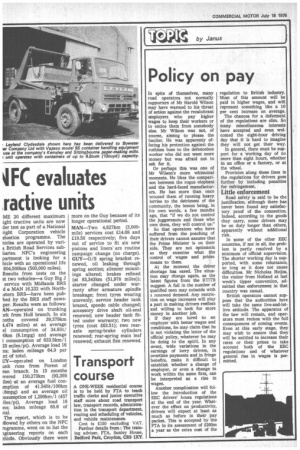Policy on pay
Page 26

If you've noticed an error in this article please click here to report it so we can fix it.
In spite of themselves, many road operators not normally supporters of Mr Harold Wilson may have warmed to his threat of action against the recalcitrant employers who pay higher wages to keep their workers or to entice them from somebody else. Mr Wilson was not, of course, aiming to please the haulier. He was apparenty offering his protection against the ruthless boss to the defenceless worker who did not want more money but was afraid not to ask for it.
Or perhaps this was one of Mr Wilson's more whimsical moments. He likes the comparison between the rogue elephant and the hard-faced manufacturers. He has more than once accused them of running heavy lorries to the detriment of the community, the lesson being, in his own words, a few months ago, that "if we do not control the juggernauts and those who own them, they will control us."
So that operators who have suffered from the poaching of their drivers cannot assume that the Prime Minister is on their side. They are not optimistic as •they examine what the control of wages and prices means to them.
At the moment the driver shortage has eased. The situation may change again, as the latest figures from the RTITB suggest. A fall in the number of qualified men may coincide with a renewed demand. Any restriction on wage increases will play a part in making drivers restless and willing to look for more money in another job.
. If they are lured to an employer with better wages and conditions, he may claim that he is not violating the letter of the official policy, whatever he may be doing to the spirit. In any • event, wide variations in the earnings of lorry drivers, in overtime payments and in fringe benefits, make it difficult to establish whether a change of employer, or even a change in work within the same firm, can be interpreted as a rise in wages.
Another complication will follow the introduction of the EEC drivers' hours regulations at the end of the year. Whatever the effect on productivity, drivers will expect at least as much as before in their pay packet. This is accepted by the FTA in its assessment of -£300m a year as the extra cost of the regulation to British industry. Most of this amount will be paid in higher wages, and will represent something like a 10 per cent increase on average.
The chances for a deferment of the regulations are slim. So many miscellaneous interests have accepted and even welcomed the eight-hour driving day that it is hard to imagine they will not get their way.
In general, there must be support for a working day of no more than eight hours, whether in an office or a factory, or at the wheel.
Provision along these lines in the regulations for drivers goes further by including penalties for infringement.
Little enforcement
Road safety is said to be the justification, although there has never been found any satisfactory proof of the connection. Indeed, according to the goods they carry, some drivers may be on duty longer than others, apparently without additional risk.
In some of the other EEC countries, if not in all, the problem is partly resolved by a minimum of official supervision. The shorter working day is supp6rted, with some reluctance, so long as it does not cause difficulties. Mr Nicholas Heijes, the visitor from Holland at last week's tipper convention, admitted that enforcement in that country was casual.
British operators cannot suppose that the authorities here will take the same live-and-letlive attitude. The apparatus of the law will remain, and operators must reckon with the full consequences of coming events. Even at this early stage, they may wish to ensure that they will be entitled to increase their rates or their prices to take account both of the EEC regulations and of whatever general rise in wages is permitted.




























































































